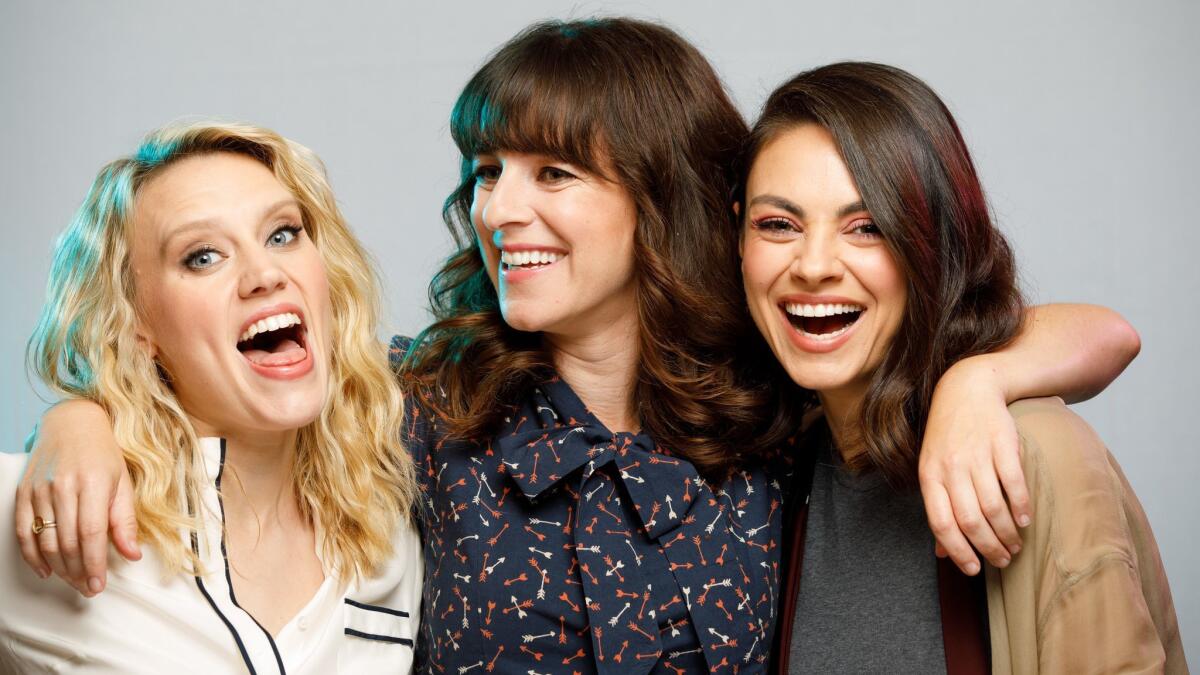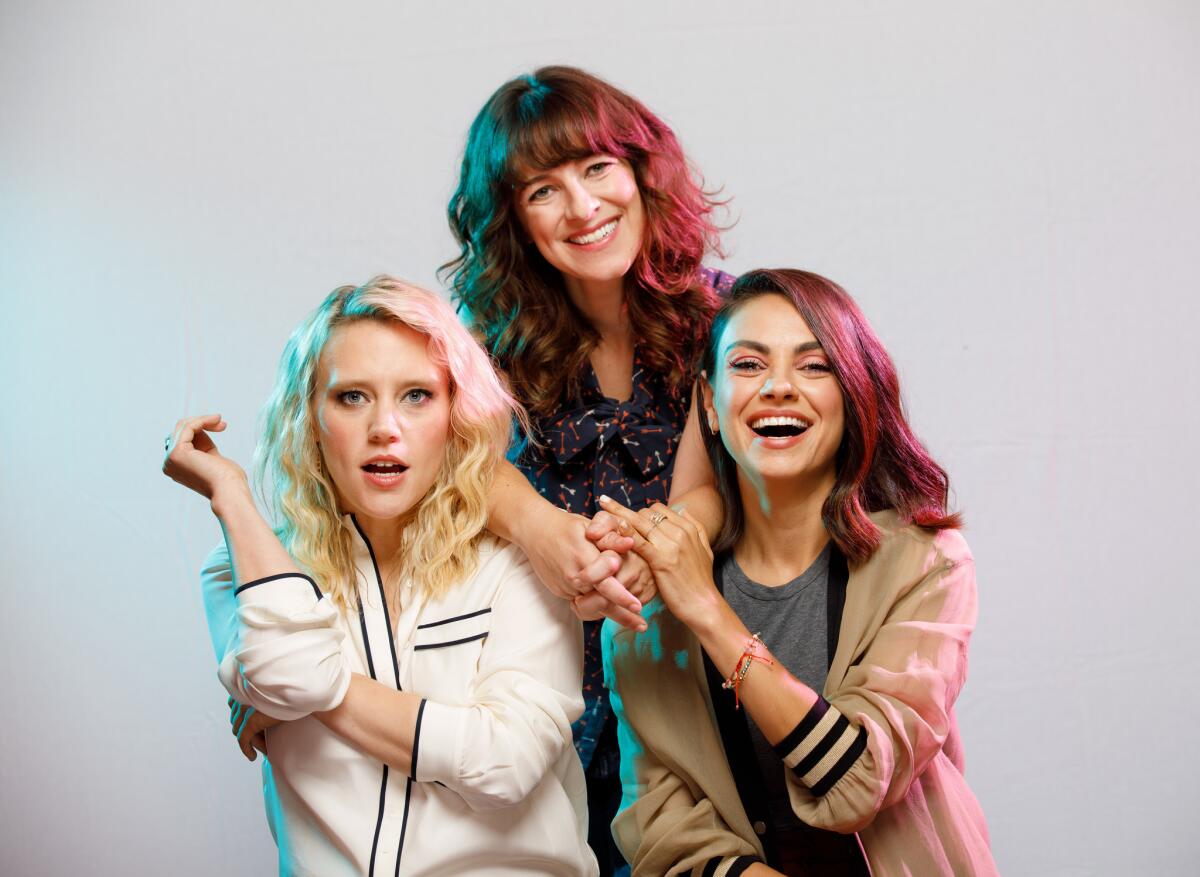Mila Kunis and Kate McKinnon play a more real female friendship for laughs in ‘The Spy Who Dumped Me’

- Share via
Having a conversation with Mila Kunis and Kate McKinnon is a lot like sitting in on an improv session at the Upright Citizens Brigade (where “Saturday Night Live” star McKinnon earned her stripes).
When asked how they prepared to play best friends in Lionsgate’s action-comedy “The Spy Who Dumped Me,” which opens Friday, Kunis and McKinnon looked at each other conspiratorially.
“We played a lot of trust games,” Kunis began. “We jumped out of a plane together.”
“We beat each other up,” McKinnon chimed in.
“Just to see what would happen.”
“We cried together.”
“We laughed together,” Kunis picked up.
“We did a seance,” McKinnon deadpanned.
“Then we went to sleep together.”
“And when we woke up ...” McKinnon began.
“We realized ...”
“Something had changed.”
“And so that was the weekend that Kate and I became really good friends,” Kunis finished.
Despite meeting for the first time on set, the two hit it off instantly.
As Brian Grazer, who produced the film with Erica Huggins, recalls, “The minute we had our first read-through where they met each other for the first time, Mila rooted every single time that Kate scored. And every single time Mila scored Kate got so much joy out of it. It was like one of these spectacular situations where they both rooted for each other as much as they rooted for themselves. And that’s the best version of a partnership.”
That chemistry, which Kunis says is impossible to predict in advance, elevated their portrayal as best friends swept up in an international conspiracy from being merely funny to believable and magnetic.
“I think any time you work on a film, you get cast and you hope that the [stars] simply just get along,” said Kunis. “And I think that in our case, we just got incredibly lucky that from the get-go we found each other entertaining. Kate made me laugh nonstop.”
“I feel like we could just riff all day,” said McKinnon.
For co-writer and director Susanna Fogel, that authentic friendship between Audrey (Kunis) and Morgan (McKinnon) was instrumental in grounding the story and making it more about the bond between these women than about the titular breakup.
“It’s become my lifetime passion as a writer to try to show female friendships in the way that I see them, which is as emotional and connected and deep,” said Fogel. “I feel like most movies about female friends derive their conflict from an extension of the high school movie rivalries or there’s some petty grievance: a competition over a guy or a wedding date or something. And I don’t relate to any of that.
“I think when I was younger I probably had more friendships that were fraught in that way,” she continued. “But now my friends are basically my family. It’s the family you choose. And I wanted to show the fun and love there.”
Equally crucial was forgoing the tired trope of the catfight or an “arbitrary friend breakup” as a plot device. “It’s just fun to see two people that genuinely get along getting along,” she said. “And they can still be an odd couple and different without having petty conflicts. It was more fun to watch them love each other.”

Kunis and McKinnon pair well together because their opposing styles of comedy are complementary: Kunis as Audrey is neurotic and strait-laced while McKinnon as always is quirky and larger than life. The stars said that while the circumstances are extreme, the roles were not much of a stretch from their everyday personas.
“We did an autobiography,” Kunis joked. “And it felt like it really captured our day-to-day really well.”
“It was basically just me,” McKinnon said of playing Morgan. “This is so rare that I read something and I see myself in it. It was a total joy and I wouldn’t say easy by any stretch because for me, being like myself is a little difficult.”
For the actress, who had supporting roles in “Ghostbusters” and “Rough Night,” laying so much of herself bare on screen was nerve-racking.
“This is the biggest role I’ve done in a film to date,” McKinnon said. “I was nervous about playing a character that was so close to myself and working in a tone that was so grounded. It was absolutely transformative and one of the greatest experiences I’ve ever had, but I was nervous.”
“We really wanted Morgan to be a performative, outlandish person,” said Fogel, who’d worked with McKinnon on the 2014 indie “Life Partners.” “But also to delve into the emotions of that type of persona and not just stop at ‘She’s crazy!’ Kate seemed to have this deep humanity and intellect that went beyond her ability to do voices and act. She seemed like someone who could both do the character’s performative self and show her humanity too.”
As for Audrey, Fogel wanted someone who seemed to have more going for her than her relationship.
“I think it’s tough especially because the catalyst for the plot is this breakup,” said Fogel. “We’re so used to seeing women in movies about a romance where they don’t seem to have any inner fortitude. They’re completely defined by their relationships and it’s hard to engage with those characters and relate to them.”
“Mila is just somebody who you instantly feel has an inner core self and strength and confidence so you can push the breakup emotions without ever losing that toughness,” she continued. “I think it was knowing that as much as the breakup could be devastating to her character, we’re never going to lose her to that cliché.”
Kunis, who toplined two “Bad Moms” films, knows how trendy R-rated female-driven comedies have grown in recent years.
“Somebody asked me, ‘Do you mind this being a trend?’” she said. “I was like, ‘No! Make it as trendy as you want so long as people see the movies.’
“This industry is based off of money and bonuses. So if a movie does well, the board of Company X doesn’t care what the movie is and who’s in it. So as long as people see these movies, they’ll keep making them.”
One thing notably different about “Spy” is that it doesn’t just star women — it was also written and directed by a woman. That’s a distressingly rare occurrence. In fact “Spy” is one of only two studio releases this summer with a female helmer.
“Our intention honestly wasn’t just ‘get a woman director,’” Grazer said. “It was just that a woman so happened to have written this really groovy movie that we’re psyched to do.”
Men have much more opportunity to have successful films, Kunis said, because every film directed by a man does not bear the onus of having to prove that there’s an audience for it. That’s one reason why when raunchy, female-driven comedies first emerged, the leads were marketed as being just as vulgar, crude and brash as their male counterparts rather than just being funny women.
“It was such a new thing to try out that they were like, ‘Well, how do we get people to come to the theaters? We’ll just have these women act like men and they’re tough and have loud mouths and do these crazy things.’ And that was their way of trying to attain an audience,” said Kunis.
“I’ve been at fault myself where I’ve done films where I’m like, ‘It’s so cool because it’s a character that’s a woman, but it could’ve been a guy!’ And with hindsight 20/20 I’m like, ‘Why did I say that?’ You just thought that was a way to get people to OK the character.”
With runaway successes like “Bridesmaids” and “Girls Trip,” people are more receptive to comedies in which women can be funny without sacrificing their femininity. But as a USC study released just this week confirmed, there’s still a long way to go: Looking at directors of the top 100 films released each year for the past 11 years, only 4.3% were women.
“I feel optimistic that people are interested in hearing from women,” said Fogel. “[But] I think there’s still parts of the conversation that have yet to be unearthed and dissected in more detail. I think people are open to talking about the inequalities but sometimes the conversation gets really generalized.
“We have to keep the conversations going at every step of the way,” she added. “And I don’t know if people are ready for that yet. I think it’s good that we’re talking about it but I think there’s still a gendered nature to the way that people see female directors’ skill sets. And I think we need to keep examining that. I don’t know if people know how complicated the issue really is.”
follow me on twitter @sonaiyak
More to Read
Only good movies
Get the Indie Focus newsletter, Mark Olsen's weekly guide to the world of cinema.
You may occasionally receive promotional content from the Los Angeles Times.











